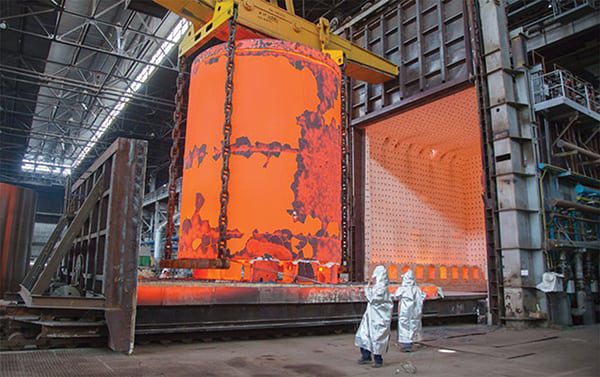New Nickel Alloy Material Could Extend Reactor Lives to 120 Years, Say Russian Researchers
A subsidiary of Rosatom’s nuclear engineering division, Atomenergomash, says a new nickel-alloy steel grade developed for the VVER-TOI core shell will extend the service life of the reactor vessel up to 120 years.
The pilot ultra-pure steel grade shell (Figure 4) tested by the Central Research Institute was produced by heavy equipment manufacturer OMZ SpetsStal. Manufacturing the shell required casting a 420-ton ingot for the first time after the collapse of the Soviet Union, said Alexander Romashkin, acting deputy director of the Metallurgy and Engineering Institute affiliated with the Central Research Institute for Machine Building Technology. “The ingot was then forged into a record-large shell, 6 [meters (m)] high and 4.5 m in diameter. As it has no weld seams, it will be used as a part of the reactor vessel [that] is most intensively bombarded by neutrons.”
According to the World Nuclear Association (WNA), the VVER-TOI (typical optimized, with enhanced information) design evolved from the AES-2006 plant with a V-392M reactor. Though the project to develop the large-capacity water reactor was launched only in 2009, Rosatom plans to make the reactor standard for new projects in Russia and worldwide, with minor variations.
In Russia, VVER-TOI reactors will be installed at Kursk NPP-2 (by 2020–2022) and Smolensk NPP-2 (by 2027). The WNA says the VVER-TOI is the chosen design for reactors Rosatom will build at Kundankulam 3 and 4 in India and at the four Akkuyu units in Turkey. The company has not decided yet where to use the new reactor shell, however.
The technological innovation is pivotal for Russia—and for the global nuclear industry. “While the reactors operated in Russia have a service life of 60 years, new VVER-1200 reactors to be installed at Novovoronezh NPP and Leningrad NPP-2 will work for 100 years. Achievements of the Central Research Institute for Machine Building Technology will make reactors live more,” Rosatom said.
Russia will now set up production of the reactor shells at the Energomashspetsstal plant owned by Atomenergomash, where the pilot shell was produced a year ago.
—Sonal Patel, associate editor
